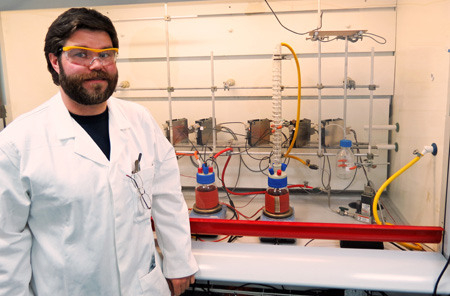The Asynt CondenSyn Air Condenser has been extensively tested by researchers in the renowned Cronin Group within the School of Chemistry at the University of Glasgow, UK.
Having implemented over 10 of these air condensers for use in inorganic and organic syntheses, as well as long term experimental systems, the Cronin Group were able to confirm that they now spend less set-up time and no longer have to worry over water leaking into electronic control and heating systems. In addition, using CondenSyn air condensers has reduced clutter in heavily used fumehood spaces, as it eliminates the need for trailing water pipes or daisy chained condensers.
Jim McIver, Chief Technician for the Cronin Group commented “Our research is focused upon on the potential of complex chemical systems, derived from non-biological building blocks, to have a major impact on our fundamental understanding of the interplay of chemical systems and to revolutionise modern technologies. Current applications we are working on range from developing materials for solar fuel devices to producing potential drug and drug delivery candidates.
 Mr McIver explained the move to using CondenSyn air condensers saying “Traditionally we have used water condensers for our chemical syntheses but have been well aware of the potential problems of low / high pressure flows and burst pipes. With many of our syntheses and experimental systems running for extended periods, and several of the systems incorporating bespoke heating and UV irradiation systems, we sought a safer, more economical alternative to using Liebig condensers and flowing water. Through implementing the CondenSyn air condensers we have removed the water issue altogether making our experimental set-ups safer, more robust and with the added benefit to the department of reduced costs and environmental sustainability by using less water.”
Mr McIver explained the move to using CondenSyn air condensers saying “Traditionally we have used water condensers for our chemical syntheses but have been well aware of the potential problems of low / high pressure flows and burst pipes. With many of our syntheses and experimental systems running for extended periods, and several of the systems incorporating bespoke heating and UV irradiation systems, we sought a safer, more economical alternative to using Liebig condensers and flowing water. Through implementing the CondenSyn air condensers we have removed the water issue altogether making our experimental set-ups safer, more robust and with the added benefit to the department of reduced costs and environmental sustainability by using less water.”
Drawing upon over 30 years of scientific glass manufacturing knowledge, Asynt has created an affordable high-surface-area air condenser which is both safe and operationally effective. The robust design of the CondenSyn uses a new borosilicate glass manufacturing technique and this, together with a proprietary multiple hyperbolic profile, ensures optimum heat removal as vapours pass along its length. CondenSyn additionally incorporates a non-roll feature to help prevent accidents if left on a lab bench. Offering clear visibility of ongoing experimental reflux, the Asynt CondenSyn is easy to clean and maintain. In extended period testing the performance of the CondenSyn air condenser has been shown to be equivalent to a Liebig type condenser being used with tap water.
For further information on CondenSyn air condensers please click HERE or contact Asynt HERE.
Comprising nearly 60 researchers- the Cronin Group conducts research in synthetic chemistry, complex chemical systems, nanotechnology, inorganic biology, self-assembly, functional materials, molecular design, molecular engineering, energy systems, new reaction formats for chemistry including robotics and 3D printing, microfluidics and novel software processing and control systems. The Group is also active in commercialising some of its work with a spin out, innovation centre, and is trying to raise significant funding for new chemical reaction formats to revolutionise molecular discovery.
You can download the full press release HERE.




